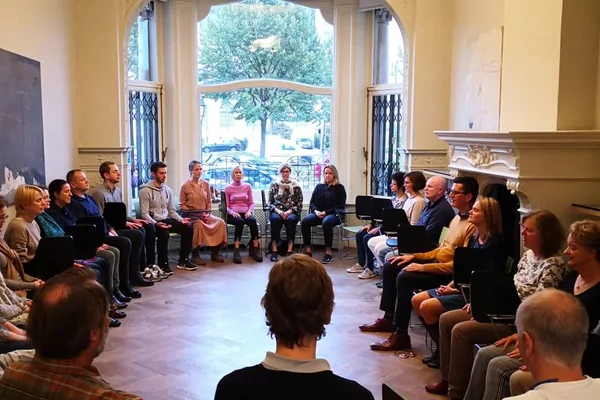Do you know the feeling that you are longing for the one button to switch off your worrying and busy mind in the evening when you get home from work? Sometimes the busyness of the mind can prevent you even from sleeping or wake you up in the middle of the night, when the worrying comes back - leaving you exhausted and miserable the next morning. Would you like to know a way to find more inner peace?
Learning to be in the present moment
In fact, even when there is no concrete threat in the present moment, many of us spend a lot of time worrying about the future or ruminating about the past. Living in this "virtual reality" is often very stressful because you do not enjoy the moment and you naturally focus on everything that's wrong. This threat detective mode of your mind can drag you down into a negative spiral. While it is helpful in life-threatening situations it is not so helpful in everyday life because in some cases, this can provoke unnecessary anxiety or even panic attacks. But the good news is that with mindfulness you can learn to be more in the present moment. Often, we experience that in the present moment there is much more right than wrong and that we tend to project catastrophes into the future which might not even come true. As Mark Twain said "My life was filled with problems. Many of them did not come true."
By learning to focus on what's actually right here and now, you can see things in a different, often more helpful and liberating perspective. You can become aware of your unconscious bias and filters and see more clearly what is true. This self-knowledge in turn can help you to regulate yourself and to find more appropriate responses to the challenges you are facing.
Allowing & letting go
The paradox of mindfulness is that by allowing everything to happen and unfold in its own time, you can find a deep sense of calm. This seems counterintuitive, as your mind often tells you that it is much more useful to try solving problems and fix things. We often try to mentally solve or get rid of problems of an emotional nature, such as stress or anxiety. However, the analytical problem-solving mode that works perfectly well with real, tangible problems, leads to never-ending cycles of worrying if we apply it to our emotions, turning round and round like a broken record.
When you step out of this frantic problem-solving mode, things can naturally unfold, and the more silent voice of your inner wisdom can speak. It needs some practice to step out of the constant doing mode and switch into a more restorative being mode. But if you regularly commit to some slow time for your brain and nervous system, the effect is that your mind and body can finally slow down and find some rest.
Being kind to yourself
If you are like many of us, you are probably very self-critical and harsh with yourself. However, if you can learn to be kind to yourself and turn down the volume in the way you speak to yourself, you will be able to experience a deep sense of calm and peace. It is the constant voice in our head telling us that we are not good enough and that we should do even more which is so exhausting. In addition, self-compassion has a ripple effect: When we are kind to ourselves, we can be kinder to others. But we cannot give when we run on empty. Therefore, it is necessary that we make self-care and self-compassion a daily priority. In our mindfulness courses and retreats compassion is a key element which needs just as much practice as mindfulness itself.
What participants of our days of nourishment or retreats tell us, is that some extra "doses" of mindfulness and compassion practice help to integrate these helpful habits more into their daily life. It becomes less of a mental to do and rather an "embodied" attitude, because your body will remember the benefits of the practice – such as peace and calm- and lets you know in a deep and natural way that an alternative is possible, when you are struggling and stressing out again. You could try it out today by practising this loving kindness meditation.







